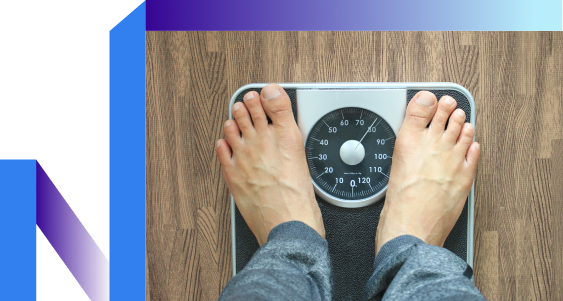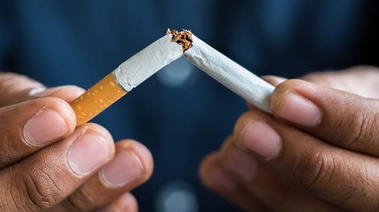Quitting smoking reverses many of the harmful effects cigarettes have on your body and prevents further damage to your lungs and other organs. Making the decision to quit is the first step to feeling healthier and happier, but you may notice yourself gaining weight after you put down the cigarettes. Regardless of weight gain, your overall health improves greatly from quitting smoking and should not be overly concerning. On average, people may gain 5 to 10 pounds in the first few months after they give up cigarettes, but not smoking is one of the best things you can do for your health.1 For some people, this extra weight may be natural or even healthy, as cigarettes can act as an appetite suppressant.1 However, if you’re worried about maintaining a healthy weight after your quit or want to make sure you don’t pick up any unhealthy habits, there are steps you can take to make sure you become your healthiest self.
Why People Gain Weight After They Quit Smoking
Not everyone gains weight after they quit smoking, but there are a few reasons that many do. Nicotine in cigarettes accelerates your metabolism, increasing the number of calories your body uses at rest by about 7% to 15%.1 Once you quit, your body may go back to burning calories more slowly.
Another common cause of weight gain after quitting smoking has to do with your appetite. Cigarettes act as an appetite suppressant, and you may eat less while smoking.1 Once you quit, you’ll likely feel hungrier and eat more as a result. Eating more food after you quit smoking isn’t a bad thing, as you may not have been eating enough to fuel your body while smoking. You may even find yourself more energized from eating more.4
For some people, weight gain after quitting is a result of filling the routine you had while smoking. Smoking is a habit and once you’ve quit for good, you might turn to high-calorie foods as a replacement.1
Tips for Maintaining a Healthy Weight After You Quit
Quitting smoking is the first step to a healthier lifestyle. If you struggle with maintaining a healthy weight after you quit, incorporate healthier habits into your daily routine.1,2,3
-
Stay active. Exercise is an important part of staying healthy, as it can improve your mood and boost your energy.5 Start exercising by walking, jogging, or going to the gym; if you already exercise regularly, try a new workout class. Just 10 minutes of exercise each day can help you burn calories and strengthen your heart and muscles.
-
Choose healthier groceries. A balanced, healthy diet consists of plenty of fruits, vegetables, legumes, and whole grains. If you find yourself wanting to reach for a cigarette, keep your hands busy with healthy finger foods like sliced apples, baby carrots, or nuts.
-
Try chewing gum. If you find yourself eating when you’re not hungry as a habit, try other options like sugar-free gum to keep your mouth busy.
-
Get a good night’s rest. Not getting enough sleep leads to a number of health problems and can lead to weight gain. Aim for at least eight hours per night.
-
Stick to healthier beverages. Swap out alcoholic beverages and sugary sodas for sparkling water, organic fruit juice, or herbal teas.
-
Eat mindfully. Enjoy your meals to the fullest by avoiding distractions while you eat. Eating at the dinner table without watching TV or scrolling through your phone can help you avoid overeating.
How to Quit Smoking
Once you make the decision to quit smoking, you may run into challenges beyond gaining weight. Staying away from cigarettes and resisting the urge to smoke takes effort, as nicotine addiction can be hard to break. Following healthy lifestyle tips help you stop smoking for good and stay healthier overall.6
-
Avoid triggers. You’re likely to crave cigarettes the most at the places you most often smoked or during times of stress. Identify your unique triggers and create a plan to avoid them as much as possible.
-
Try relaxation techniques. For many people, smoking helps manage stress. Once you quit, try healthier ways of managing anxiety or stress such as yoga, deep breathing, or meditation.
-
Distract yourself. Keeping your hands and mouth busy helps you avoid the urge to smoke. Try eating healthy snacks like carrots or sliced apples or chewing sugar-free gum.
-
Sweat it out. Physical activity, like jogging or lifting weights, can help distract yourself from quitting cigarettes and maintain a healthy weight.
-
Try nicotine replacement therapy. Treatments in the form of gum, a patch, or lozenges give you small doses of nicotine to help curb cravings while you transition away from cigarettes. Nicorette gum delivers a therapeutic dose of nicotine to help you adjust to life as a nonsmoker.
Making the decision to quit smoking is the first step on your journey to becoming healthier and happier. Giving up cigarettes can be challenging but practicing healthy habits can help you stop smoking and maintain a healthy weight. Read more articles from Nicorette and find resources to help you quit.






